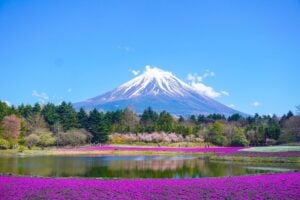
At a glance the entry level salaries may seem a bit low in Japan. Fortunately, once you start living here it soon becomes apparent that the cost of living is also quite cheap. With the relative ease of living without common expenses like a car, with cheap health insurance, employers paying travel expenses, and much cheaper rent than in many western countries, lower wages are usually not too much of a problem. Whilst all that’s true, what if you do want to enjoy the finer things? As wonderful as the public transport system is, a car still offers greater freedom. Whatever the case, who doesn’t want a little bit more money?
As an expat working in Japan, you naturally have a few unique skills that set you apart from the wider population. Skills like a native fluency in languages other than Japanese are the biggest things you bring to the table, but it is by no means the only skill you can employ. Foreign Cultural understandings and influence may open doors in areas like design, and give you advantage or uniqueness in arts. In fact, simply being foreign at all will make you attractive to some jobs such as in the service industry. A French restaurant would find a French chef or waiter to be a nice touch!
Furthermore, simply having skills and passion for something can be enough to land you a side job. Moreso than ever before, Japan has and is opening up to the hiring of foreigners into position traditionally reserved for natives. Whilst you are still going to find the vast majority of expat positions in Japan fall under tech, education and translation services, it is by no means limited to those fields anymore. The reason for this change is due to both the ageing population, there are simply more positions than people in some fields, and a generally less xenophobic society in general. If you have a passion for mountain climbing, it may well pay off to look into jobs at mountain huts. The weekends are after all the busiest time for them. If you are into beer brewing, the craft beer scene in Japan is starting to blossom, and opportunities exist! Such jobs will certainly be rarer than the standard tech or education gig, and might not be full time (and thus not be able to offer a work Visa), but they do exist!
The biggest questions however are, what’s the legality of all this? Can I legally work two jobs in Japan? Does it depend on my Visa type? Is my primary boss able to forbid it? It is important that you understand these questions and others, because you might be risking your Visa and life in Japan if you don’t follow the rules. Therefore, in order to help you enjoy your time in Japan with the level of financial comfort you desire, today we will look at these and other questions. Furthermore, we shall illuminate some of the jobs that you might like to do, and how to get your foot in the door.
Visa Laws and Freelancing in Japan
First and foremost, you must hold a valid working visa to work in Japan. As this article primarily is discussion to freelancing (or additional employment), we will assume you already have a valid work visa, and are already working in Japan.
Under Japanese Visa laws, you cannot work any type of job on any type of visa, but you are allowed to perform additional work. The Important thing is that you are restricted to the type of work you may do by your visa, and these restrictions apply to any further jobs you might take. For example, if you are on an instructor’s visa, you can not legally work as a musician without further permission. If you ignore these restrictions you may get in trouble with immigration, and it will certainly hurt your application for renewal.
Whilst this is easy to understand most of the time, it can be a little confusing with the “instructor” visa. This visa is often given to English teachers or ALT’s in primary and secondary school education. One would assume such a visa would allow private English tuition, or work at Eikawa, but it does not. For those positions, you require the broader humanities visa. Be sure to confirm the type of work is allowable under your visa!
Gaining Permission to work in a different field
If your type of Visa and the type of moonlighting you wish to do don’t match, it is not necessarily the end. You may apply with the immigration services for special permission. “Permission to engage in an activity other than those permitted by the status of residence previously granted”, as it is entitled by immigration, will be granted under the following conditions:
- The second job will not interfere with the first.
- The primary job is related to the current visa. Basically, you can not get permission to work in another activity if you are not currently working in the area of your visa.
- The activity you are seeking permission for must be of those included in “Table 1 or 2 of Appendix 1 of the Immigration Control Act”. For example, adult entertainment work and manual labor are not allowed.
- The activity is not illegal, or carried out in a store that deals with adult entertainment.
- You have not received or been notified of the issuance of a detention order or opinion hearing notification, nor exhibit “bad behavior”.
- Your contracted employer agrees to allow the additional work.
With permission, you can now legally work up to 28 hours in an additional job that falls within a different field to your currently valid work visa. In order to apply for such permission, submit the application and required documents to the Regional Immigration Services Bureau that services the area you live in. The forms can be downloaded on the official website.
Company Permission
Many work contracts in Japan stipulate that you may not work second jobs, or that you must gain permission before doing so. However, these clauses are trumped by the Japanese constitution, specifically article 22 “Every person shall have freedom to choose and change his residence and to choose his occupation to the extent that it does not interfere with the public welfare.”
What this therefore means is that legally you can work second jobs, regardless of your contract. It is advisable therefore to read the atmosphere of your work environment and managers. If they are likely to grant permission, perhaps the political move would be to seek it. If it seems unlikely however, just do it. You cannot be fired for it, but it could potentially give you headaches and an unpleasant time.
Freelancing jobs in Japan
With all the legal issues out of the way, just what kind of moonlighting work is there in Japan? The most common work is English language instruction. It is very easy to find part time work at an English school, and the hours are also mostly outside work/school hours, as this is when the students come. The pay is decent, usually somewhere between 1500 to 3000 yen per hour depending on your experience.
Another type of teaching job that works well for moonlighting is remote English (or other) language instruction. As long as you have a good internet connection and can make a good profile, you can find students online. In this case though you may be competing with people outside of Japan, but some students prefer people in country.
Translation and, more commonly these days, copy writing and proof-reading jobs are also good ways to earn a bit more yen in your downtime. Translation will obviously pay better, but requires Japanese fluency. Proof-reading can vary from fixing bad machine translations to touching up already decent English.
Restaurant, shop keeping and other service industry jobs can also be good options for moonlighting. With the hours including weekends or nights, it won’t interfere with your main job. Furthermore, if you feel your job as an English teacher is not giving you any chances to practice your Japanese, the service industry presents a good chance to participate in a Japanese work environment. Naturally the pay will probably be lower. The quickest and easiest job of this type to find is as a convenience store clerk.
Besides the more common gigs you should be able to find listed above, there also exist opportunities to work in more specialized fields in Japan. These types of jobs require passion and talent, and if you are able to demonstrate such, you have a shot of landing the job regardless of not being a native and all that entails.
A good example (which personally helped me out a few times!) is musician work. Working gigs at bars, events, gatherings, birthdays and so forth will require special permission to anyone not on an entertainer Visa. However, technically and legally, even street busking requires such permission. You never know if the man in the suit walking past is an immigration officer! Street busking is a little less common in Japan than countries like Australia, but it is not unappreciated, and makes for the perfect moonlight gig.
Artistic and craftsmen work is also opening up the foreigners. As the language barrier is not as much of an issue when communicating through artwork, if you demonstrate your skills, you have a shot at landing work orders. A friend who lives in the same village as myself crafts crochet work and sells patterns online. The quality of the work speaks for itself, and she is even thinking of giving up her “real” job. We have had jobs on Jobs in Japan recently at a micro-brewery, and one making Kendo gear. The latter two applicants landed the jobs as they expanded on hobbies, and the employer thought their interest and motivation were more important than Japanese language fluency.
As for myself, I am currently employed in a second job maintaining a very large blueberry farm. I landed this job by first applying for the harvest season, but because I expressed an interest in pruning and the whole cycle in general, I was trained up and given responsibility over an entire field.
Case Studies
To make this all a little easier to understand, here are some case studies that illustrate specific circumstances.
| Visa Type | Extra Activity | Case Study |
|---|---|---|
| Instructor | Eikaiwa | Those on an instructor Visa require “Permission to engage in an activity other than those permitted by the status of residence previously granted” to teach English in a private school. You will need to apply at the immigration bureau. |
| Instructor | Waiter/waitress | You will need “Permission to engage in an activity other than those permitted by the status of residence previously granted” to work in a field different from your Visa. Apply at the immigration bureau. |
| Humanities | Eikaiwa | As the humanities visa covers this type of work, you are free to moonlight in this area. |
| Humanities | Copy-writer | As the humanities visa covers this type of work, you are free to moonlight in this area. |
| Humanities | Musician | You will need “Permission to engage in an activity other than those permitted by the status of residence previously granted” to work in a field different from your Visa. Apply at the immigration bureau. Even if the work is unofficial, such as street busking or gigging, you still legally require this permission. |
| Spouse | Mountain guide | A spouse visa has no restrictions, so you may understand further work with no additional permissions required. |
So, we see that it is both legal and possible to moonlight in Japan. If you feel you would like a little more money, and you have some spare time, you can find a second job in a variety of opportunities. If your Visa is limiting, make sure to apply for “Permission to engage in an activity other than those permitted by the status of residence previously granted”, to keep it legal.
Whilst I have verified the contents of this article, laws change and things get missed. This article should not be completely trusted with your Visa at stake! If you would like to confirm the latest information relating to Immigration law and Visa law in Japan, you should visit the official website at https://www.isa.go.jp/en/.















